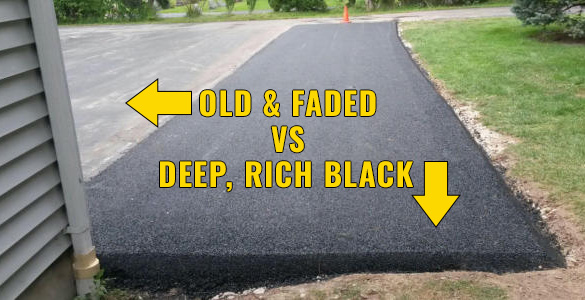Lasting Outcomes: Asphalt Patch Repair Via Precision Sealing
Lasting Outcomes: Asphalt Patch Repair Via Precision Sealing
Blog Article
Cold Mix Asphalt Vs. Hot Mix Asphalt: Which Is Right for You?

Structure Distinctions
Cold mix asphalt is produced by emulsifying the asphalt binder with water and an emulsifying agent before mixing it with aggregate. The warm mix asphalt manufacturing procedure includes heating up the accumulation and asphalt binder independently prior to combining them at the asphalt plant.
In addition, cold mix asphalt has a tendency to be much less thick and extra adaptable than warm mix asphalt. This versatility makes it much better fit for locations with higher levels of movement, such as driveways or roads with rush hour. On the other hand, warm mix asphalt is recognized for its high resilience and resistance to rutting and fracturing, making it a recommended selection for freeways and high-traffic roads where longevity is vital.
Setup Process Differences
The process of installing cool mix and warm mix asphalt exhibits noteworthy variations in their needs and treatments. Cold mix asphalt, being a much more versatile material, can be used directly from the bag or container onto the pocket or harmed area. It requires very little preparation work, such as cleaning the location and compacting the chilly combine with hand devices. This makes it a practical option for momentary and quick solutions. On the other hand, hot mix asphalt requires a more intricate setup procedure. It includes heating the mix to heats before laying it down on an appropriately prepared base. The prep work includes condensing the base, applying a tack layer, and utilizing hefty machinery like pavers and compactors for a sturdy and smooth coating. Due to the home heating requirements, warm mix asphalt installations are typically executed by professionals with specific tools, making sure a more structurally sound and permanent outcome.
Resilience and Durability Aspects
When considering asphalt options, sturdiness and durability are crucial variables to evaluate for lasting pavement efficiency. Hot mix asphalt (HMA) is recognized for its remarkable resilience and longevity. The high temperatures during the mixing and laying process permit for far better compaction, leading to a denser and more powerful sidewalk structure. This results in HMA being more immune to heavy traffic lots, rough weather condition problems, and the results old contrasted to cold mix asphalt (CMA)
In regards to longevity, HMA usually exceeds CMA due to its superior strength and resistance homes. HMA sidewalks have a longer life span, requiring less constant repair work and upkeep, which can equate to set you back financial savings over time. Furthermore, HMA sidewalks are a lot more easily adjustable to meet specific project demands, even more boosting their toughness.
Expense Factors To Consider
Considering the financial effects is an essential element when assessing the option between hot mix asphalt (HMA) and cold mix asphalt (CMA) for pavement tasks. While the first price of hot mix asphalt is normally greater than that of chilly mix asphalt, HMA typically gives a imp source more cost-effective remedy in the lengthy run due to its remarkable durability and longevity.
Along with product expenses, it's necessary to take into consideration the expenses linked with installment and maintenance when comparing HMA and CMA. HMA typically needs specialized tools and knowledgeable labor for correct setup, which can impact overall task expenses. On the other hand, CMA is easier to collaborate with and can commonly be applied making use of less complex strategies, potentially lowering setup expenses. Inevitably, the choice between HMA and CMA should take into consideration not just the preliminary expense but likewise the long-term monetary ramifications to identify the most economical option for the details sidewalk job.
Environmental Impact Comparison
Contrast of the ecological effects between warm mix asphalt (HMA) and cool mix asphalt (CMA) exposes unique distinctions in sustainability practices. HMA production calls for high temperature levels, leading to increased power consumption and greenhouse gas exhausts. The process also launches unpredictable natural substances (VOCs) and harmful air toxins (HAPs) into the ambience. On the other hand, CMA is produced and applied at lower temperature levels, lowering power use and exhausts substantially. The reduced production temperature levels of CMA result in decreased fuel intake and lower degrees of carbon dioxide discharges, making it an extra ecologically pleasant choice.
Furthermore, the use of CMA usually includes recycling existing asphalt pavement, promoting source conservation and decreasing the amount of waste sent out to landfills. By deciding for CMA over HMA, roadway construction tasks can contribute favorably to environmental conservation efforts.
Conclusion
Finally, the selection between chilly mix asphalt these details (CMA) and warm mix asphalt (HMA) depends on various variables such as composition, setup procedure, sturdiness, long life, price, and environmental effect. cold mix asphalt. While CMA provides a fast and cost-effective solution for minor repair services, HMA makes sure exceptional durability and longevity for rush hour areas. Consider these elements meticulously to determine which kind of asphalt is the ideal selection for your paving needs

Taking into consideration the financial ramifications is an essential element when examining the choice in between warm mix asphalt (HMA) and cold mix asphalt (CMA) for pavement jobs. While the preliminary price of hot mix asphalt is normally greater than that of cold mix asphalt, HMA frequently provides a much more cost-efficient solution in the long run due to its premium sturdiness and durability. cold mix asphalt.Contrast of the environmental effects in between hot mix asphalt (HMA) and cold mix asphalt (CMA) discloses distinctive differences in sustainability practices.In verdict, the option additional resources in between cool mix asphalt (CMA) and hot mix asphalt (HMA) depends on different variables such as composition, installation process, sturdiness, long life, expense, and environmental influence
Report this page